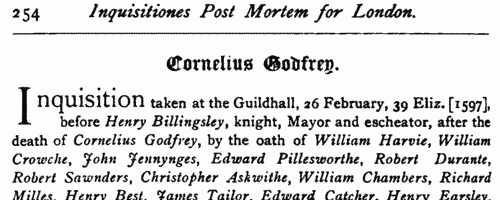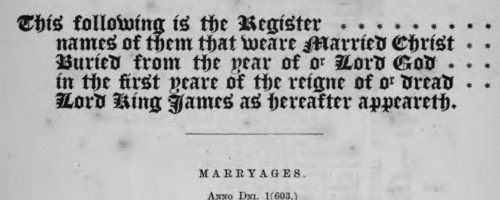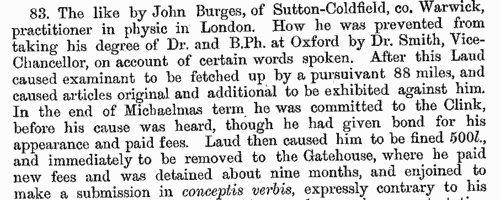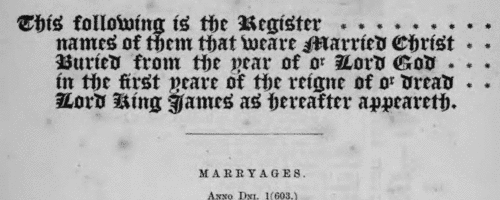Essington Surname Ancestry ResultsOur indexes 1000-1999 include entries for the spelling 'essington'. In the period you have requested, we have the following 83 records (displaying 1 to 10): Single Surname Subscription | | | Buying all 83 results of this search individually would cost £364.00. But you can have free access to all 83 records for a year, to view, to save and print, for £100. Save £264.00. More... |
These sample scans are from the original record. You will get scans of the full pages or articles where the surname you searched for has been found. Your web browser may prevent the sample windows from opening; in this case please change your browser settings to allow pop-up windows from this site. Close Rolls
(1313-1318)
The close rolls of the 7th, 8th, 9th, 10th and 11th years of the reign of king Edward II record the main artery of government administration in England, the orders sent out day by day to individual officers, especially sheriffs of shires: they are an exceptionally rich source for so early a period. In amongst this official material, the rolls were also used as a way of recording many acknowledgments of private debts and contracts between individuals. Most of the contents relate to England, but there are also entries concerning Wales, Scotland, Ireland and the English possessions in France.ESSINGTON. Cost: £4.00.  | Sample scan, click to enlarge

| Staffordshire entries on the Assize, De Banco and Fine Rolls
(1307-1327)
Extracts of Staffordshire entries from these three series of records for the reign of king Edward II were made by Major-General the Hon. G. Wrottesley, and published by the William Salt Society in 1888. The justices in eyre (itinerant) holding assizes not only tried all civil actions outstanding on their advent, pleas of the crown and common pleas, but also interrogated the juries of each hundred and borough as to the Articles of the Eyre, inquiring into the king's proprietary rights, escheats, wardships, and questions of maladministration. The court of King's Bench (de Banco) sat in Westminster, similarly dealing with court cases brought in from throughout the country. The fine rolls record part of the government administration in England, with orders sent out day by day to individual officers, and commitment of particular responsibilities and duties. Wrottesley's extracts are far from exhaustive, as he confined his attention to those landed gentry families that he considered of importance.
ESSINGTON. Cost: £4.00.  | Sample scan, click to enlarge

| Freemen of London
(1540-1550)
The long series of mediaeval registers and books of admission of the freemen of London was destroyed by fire in 1786. Thirty surviving charred leaves were gathered together and rebound, becoming Egerton MS 2408 in the British Museum. The order is jumbled and generally speaking none can be dated with certainty, although all belong to the very end of the reign of Henry VIII and the start of the reign of his son, Edward VI. These are pages from the admission books. Each entry here usually gives the name of the person admitted to the freedom; his father's name, address and occupation; his entitlement to the freedom, usually by having served out an apprenticeship to a citizen, naming the master and his trade. Then there may follow a cross-reference to M. or N., being two volumes of another set of official books denoted by the letters of the alphabet, and following each other in chronological sequence, which evidently gave details of entries into apprenticeships. These other books no longer exist: but the dates given for entry do identify the start of the apprenticeship, and so give by implication a date for the eventual admission to freedom. In the margin is the name of the city ward and the total of the fee and fine paid on admission.ESSINGTON. Cost: £4.00.  | Sample scan, click to enlarge

| London Inquisitions Post Mortem
(1577-1603)
Full and complete abstracts of inquisitions post mortem for the City of London in this period. These are inquiries as to the real estate and heir of each person holding in capite or in chief, i. e. directly, from the Crown. The precise date of death of the deceased and the age and relationship of the heir are usually recorded. This index covers all names mentioned, including jurors, tenants, &c. This abstract also includes a handful of earlier items omitted from previous volumes.ESSINGTON. Cost: £4.00.  | Sample scan, click to enlarge

| Wandsworth Bridegrooms
(1619)
The ancient parish of Wandsworth in Surrey comprised the single township of Wandsworth, including the hamlets of Garratt, Half Farthing and Summers Town. It lay in the archdeaconry of Surrey of the diocese of Winchester: unfortunately, few bishop's transcripts of Surrey parish registers survive earlier than 1800. Although the original parish registers of Wandsworth doubtless commenced in 1538, the volume(s) before 1603 had been lost by the 19th century. In 1889 a careful transcript by John Traviss Squire of the first three surviving registers was printed, and we have now indexed it year by year. The marriage registers rarely give more information than the date of the wedding, and the names of bride and groom. Prior to 1662 it was not normally indicated whether a marriage was by banns or by licence. Surrey archdeaconry marriage bonds &c. survive from 1674 onwards.ESSINGTON. Cost: £2.00.  | Sample scan, click to enlarge

| Official Papers
(1623)
The State Papers Domestic cover all manner of business relating to Britain, Ireland and the colonies, conducted in the office of the Secretary of State as well as other miscellaneous records. Includes some material from previous years, as early as 1603.
ESSINGTON. Cost: £4.00.  | Sample scan, click to enlarge

| Official Papers
(1625-1626)
The State Papers Domestic cover all manner of business relating to Britain, Ireland and the colonies, conducted in the office of the Secretary of State as well as other miscellaneous records.
ESSINGTON. Cost: £4.00.  | Sample scan, click to enlarge

| PCC Probate Abstracts
(1630-1634)
The Prerogative Court of Canterbury's main jurisdiction was central and southern England and Wales, as well as over sailors &c dying abroad: these brief abstracts usually give address, date of probate and name of executor or administrator
ESSINGTON. Cost: £2.00.  | Sample scan, click to enlarge

| Official Papers
(1641-1643)
The State Papers Domestic cover all manner of business relating to Britain, Ireland and the colonies, conducted in the office of the Secretary of State as well as other miscellaneous records. These records are from June 1641 to December 1643: there is also a set of abstracts of navy correspondence.
ESSINGTON. Cost: £4.00.  | Sample scan, click to enlarge

| Wandsworth Burials
(1644)
The ancient parish of Wandsworth in Surrey comprised the single township of Wandsworth, including the hamlets of Garratt, Half Farthing and Summers Town. It lay in the archdeaconry of Surrey of the diocese of Winchester: unfortunately, few bishop's transcripts of Surrey parish registers survive earlier than 1800. Although the original parish registers of Wandsworth doubtless commenced in 1538, the volume(s) before 1603 had been lost by the 19th century. In 1889 a careful transcript by John Traviss Squire of the first three surviving registers was printed, and we have now indexed it year by year. The early burial registers contain little detail - date of burial, and full name. For the burial of children, the father's name is also stated; for the burial of wives, the husband's. Such details as date or cause of death, age, address or occupation are almost never given. On the other hand, the Wandsworth burial registers of the early 17th century are particularly important because they contain the names of adults born well back into the 16th century, a period for which the parish registers no longer survive. Moreover, the burial registers are considerably more bulky than the baptism registers, because the burying ground was used by Dissenters, who formed a large part of the population. P. indicates death by plague.ESSINGTON. Cost: £4.00.  | Sample scan, click to enlarge

|
Research your ancestry, family history, genealogy and one-name study by direct access to original records and archives indexed by surname.
|












